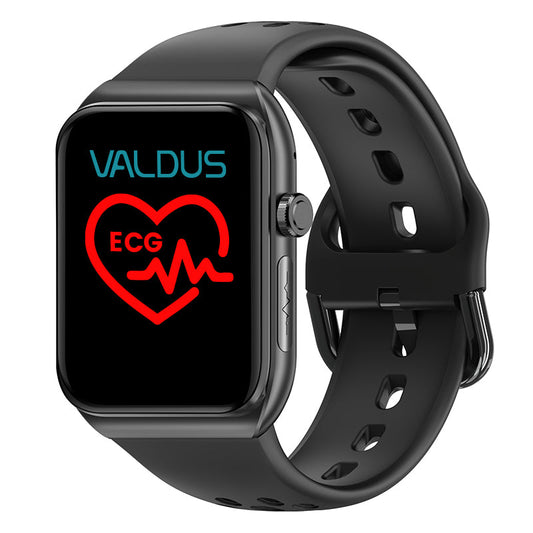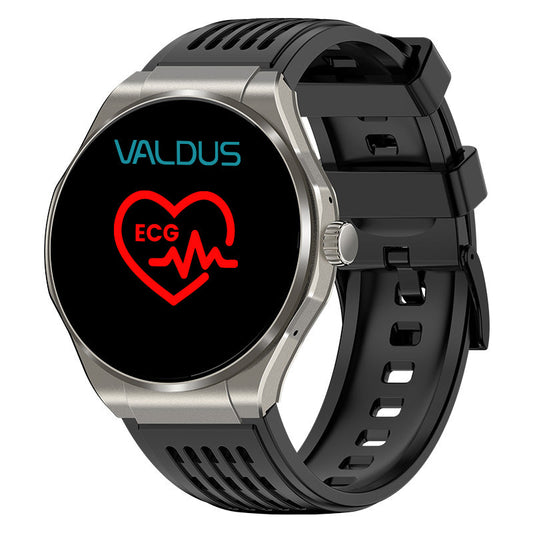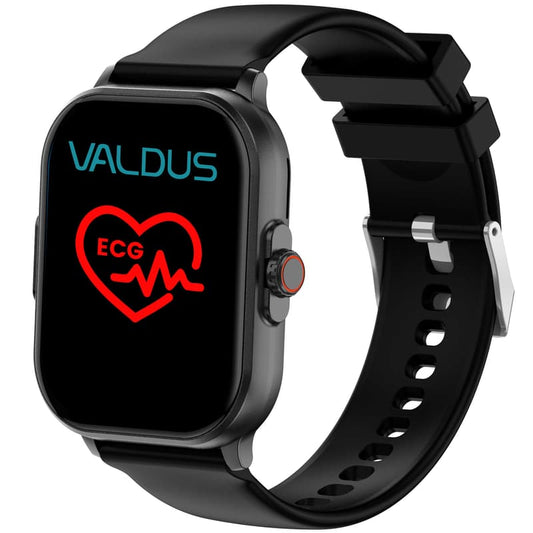
ECG vs EKG: aclarando la confusión
Compartir
Los electrocardiogramas son herramientas fundamentales en cardiología, ya que brindan información vital sobre la salud del corazón. Pero, ¿es ECG o EKG? Si estos términos le resultan confusos, no es el único. A pesar de que se usan indistintamente, tienen diferencias sutiles que tienen su origen en la historia, el lenguaje y el uso. Este artículo tiene como objetivo aclarar la confusión entre ECG y EKG, explorando sus definiciones, aplicaciones e importancia en la medicina moderna.
Introducción
Cuando se habla de monitorización cardíaca, los términos ECG y EKG aparecen a menudo, lo que a veces genera confusión. Ambos hacen referencia a la misma prueba médica, pero su uso depende de diferencias geográficas y lingüísticas. Comprender la distinción entre ECG y EKG es fundamental, no solo para los profesionales médicos, sino también para cualquier persona interesada en la salud cardíaca.
Esta guía completa le explicará todo lo que necesita saber sobre el ECG y el EKG, destacando sus diferencias, similitudes y por qué existe la distinción en primer lugar. Al final, comprenderá claramente estos términos y su importancia en cardiología.
¿Qué es un ECG?
Un electrocardiograma (ECG) es una prueba no invasiva que mide la actividad eléctrica del corazón. Registra el momento y la intensidad de estas señales eléctricas a medida que pasan por el corazón, lo que puede ayudar a diagnosticar diversas afecciones cardíacas, como arritmias, ataques cardíacos y otros trastornos cardíacos.
¿Qué es un ECG?
EKG significa Elektrokardiogramm, que es simplemente la forma en que se escribe la misma prueba en alemán. La "K" de EKG proviene de la palabra alemana "Kardio", que significa corazón. En esencia, ECG y EKG son pruebas idénticas, siendo EKG el término preferido en países como Alemania y algunas partes de Europa.
Contexto histórico: ¿Por qué dos nombres?
La doble terminología se remonta a principios del siglo XX, cuando el fisiólogo holandés Willem Einthoven desarrolló el primer electrocardiógrafo práctico. Inicialmente utilizó la ortografía alemana, lo que condujo a la adopción generalizada del término EKG en Europa. A medida que la tecnología se extendió a los países de habla inglesa, el término ECG se hizo más común, aunque el término EKG persistió, en particular en la literatura más antigua y entre quienes habían recibido formación en las tradiciones médicas europeas.
Explicación técnica del ECG/EKG
Tanto el ECG como el EKG funcionan colocando electrodos sobre la piel del paciente para detectar las señales eléctricas generadas por el corazón. Estas señales se registran y se muestran como una forma de onda en un monitor o se imprimen en papel. La forma de onda consta de varias partes, entre ellas la onda P, el complejo QRS y la onda T, cada una de las cuales representa diferentes fases del ciclo eléctrico del corazón.
Usos comunes del ECG/EKG en medicina
El ECG es una herramienta versátil que se utiliza en diversos ámbitos médicos. Suele ser la primera prueba que se realiza cuando un paciente presenta síntomas como dolor en el pecho, dificultad para respirar o palpitaciones. A continuación, se indican algunas aplicaciones habituales:
- Diagnóstico de ataques cardíacos : el ECG/EKG puede detectar signos de un ataque cardíaco al identificar anomalías en la actividad eléctrica del corazón.
- Detección de arritmias : Los ritmos cardíacos irregulares, como la fibrilación auricular, se pueden diagnosticar mediante esta prueba.
- Monitoreo de la salud cardíaca : las pruebas de ECG/EKG regulares pueden ayudar a monitorear la efectividad del tratamiento para diversas afecciones cardíacas.
- Evaluación prequirúrgica : antes de la cirugía, a menudo se realiza un ECG para evaluar el riesgo de complicaciones cardíacas.
Interpretación de los resultados del ECG/EKG
La interpretación de un ECG/EKG requiere conocimientos especializados, ya que implica analizar la forma de onda, la duración y los intervalos. Por ejemplo, un intervalo QT prolongado podría indicar un riesgo de arritmias peligrosas, mientras que la elevación del segmento ST podría sugerir un ataque cardíaco en curso.
ECG vs EKG: ¿Qué término debería utilizar?
En la mayoría de los países de habla inglesa, el término ECG es el que utilizan los profesionales sanitarios. Sin embargo, el término EKG sigue siendo ampliamente reconocido y utilizado, especialmente en contextos académicos o por personas con formación en sistemas médicos europeos. Cuando hable de pruebas cardíacas con su médico, cualquiera de los dos términos es aceptable, pero el término ECG es más universal.
¿Por qué la confusión?
La confusión entre ECG y EKG surge principalmente del uso de diferentes idiomas y tradiciones de formación médica. En la práctica, son la misma prueba y la elección del término suele depender de preferencias personales o regionales.
El papel del ECG/EKG en cardiología
El ECG/EKG desempeña un papel fundamental en cardiología, ya que es una herramienta de diagnóstico de primera línea. Proporciona información valiosa sobre la actividad eléctrica del corazón, que puede ser fundamental para diagnosticar y tratar las enfermedades cardíacas. Ya sea que lo llamemos ECG o EKG, la prueba sigue siendo una piedra angular de la atención cardíaca moderna.
ECG/EKG en Medicina de Urgencias
En situaciones de emergencia, el ECG es indispensable. En el caso de pacientes que presentan dolor torácico agudo u otros síntomas que sugieren un ataque cardíaco, suele realizarse un ECG de inmediato. La rápida interpretación de los resultados puede orientar las intervenciones que salvan vidas, como la trombólisis o la angioplastia.
Avances en la tecnología de ECG/EKG
Con el paso de los años, la tecnología de ECG/EKG ha evolucionado significativamente. Las máquinas modernas son más compactas, fáciles de usar y capaces de proporcionar información más detallada. Además, los avances en salud digital han permitido la monitorización remota de ECG/EKG, lo que permite que los pacientes sean monitoreados en tiempo real desde sus hogares.
ECG/EKG en Medicina Deportiva
Los atletas suelen someterse a pruebas de electrocardiograma como parte de sus exámenes físicos previos a la participación. Esto es especialmente importante para detectar afecciones como la miocardiopatía hipertrófica, que puede aumentar el riesgo de muerte súbita cardíaca durante la actividad física intensa.
Comprensión de las formas de onda del ECG/EKG
La forma de onda producida por un ECG/EKG consta de varias partes distintas:
- Onda P : Representa la despolarización auricular.
- Complejo QRS : Representa la despolarización ventricular.
- Onda T : Representa la repolarización ventricular.
Cada parte de la forma de onda proporciona información específica sobre la actividad eléctrica del corazón y puede indicar una función cardíaca normal o anormal.
ECG/EKG en Telemedicina
Con el auge de la telemedicina, la tecnología de ECG/EKG se ha adaptado para permitir la monitorización remota. Los dispositivos portátiles de ECG/EKG pueden transmitir datos a los proveedores de atención médica, lo que permite la evaluación e intervención en tiempo real. Esto es particularmente beneficioso para los pacientes con enfermedades cardíacas crónicas o aquellos que viven en áreas remotas.
ECG/EKG y detección de enfermedades cardíacas
Las pruebas de ECG/ECG de rutina suelen formar parte de los programas de detección de enfermedades cardíacas, especialmente para personas con alto riesgo, como aquellas con antecedentes familiares de enfermedades cardíacas, presión arterial alta o diabetes. La detección temprana de anomalías puede conducir a un tratamiento rápido y a mejores resultados.
ECG/EKG en cardiología pediátrica
Los cardiólogos pediátricos también se basan en el ECG/EKG para diagnosticar cardiopatías congénitas, arritmias y otros problemas cardíacos en niños. La interpretación de los ECG/EKG pediátricos requiere conocimientos especializados debido a las diferencias en la frecuencia cardíaca y los patrones de forma de onda en los niños en comparación con los adultos.
El futuro de las pruebas de ECG/EKG
El futuro de las pruebas de ECG/EKG parece prometedor, con investigaciones en curso centradas en mejorar la precisión, la portabilidad y la facilidad de uso. Innovaciones como la interpretación de ECG/EKG asistida por IA y los dispositivos portátiles están destinados a revolucionar la forma en que se monitorea la salud cardíaca.
Preguntas frecuentes
¿Cuál es la principal diferencia entre ECG y EKG?
La principal diferencia es lingüística. ECG significa Electrocardiograma, el término en inglés, mientras que EKG significa Elektrokardiogramm, el término en alemán. Ambos hacen referencia a la misma prueba.
¿Pueden el ECG y el EKG detectar un ataque cardíaco?
Sí, el ECG/EKG puede detectar signos de un ataque cardíaco al identificar anomalías en la actividad eléctrica del corazón.
¿Se sigue utilizando el ECG en la medicina moderna?
Sí, el ECG todavía se utiliza, sobre todo en Europa y en el ámbito académico. Sin embargo, su uso es más habitual en los países de habla inglesa.
¿Cómo funciona un ECG/EKG?
El ECG/EKG funciona colocando electrodos en la piel para detectar las señales eléctricas del corazón, que luego se registran y analizan.
¿Por qué se prefiere el ECG al EKG en los países de habla inglesa?
Se prefiere ECG porque se alinea con la ortografía y pronunciación en inglés de Electrocardiograma, mientras que EKG refleja la ortografía alemana.
¿Existen riesgos asociados al ECG/EKG?
El ECG es una prueba segura, no invasiva y sin riesgos significativos. Implica únicamente la colocación de electrodos sobre la piel.
Conclusión
Comprender la diferencia entre ECG y EKG es fundamental para cualquier persona interesada en la salud cardíaca. Si bien los términos se utilizan indistintamente, conocer las raíces históricas y lingüísticas puede aclarar cualquier confusión. Ya sea un profesional médico o un paciente, reconocer que ECG y EKG son dos caras de la misma moneda mejorará su comprensión y comunicación sobre la salud cardíaca.





